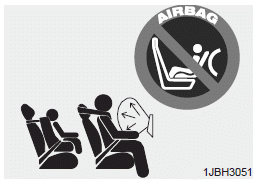Symptom
|
Suspected Area
|
Remedy
|
Charging warning lamp does not turn on during IG ON.
|
Broken alternator main fuse
|
Inspect / Repair / Replace fuse.
|
Broken instrument cluster fuse
|
Inspect / Repair / Replace fuse.
|
Broken instrument cluster internal bulb
|
Inspect / Repair / Replace instrument cluster.
|
Defective connection of wiring connector
|
Inspect / Repair / Replace wiring connection.
|
Defective voltage regulator or alternator
|
Inspect / Repair / Replace voltage regulator or alternator.
|
Defective connection of battery terminal
|
Inspect tightening of (+) and (-) battery terminals to specified torque.
|
Communication error
|
Inspect wiring between regulator and ECM.
|
Inspect transmission signal of ECM.
|
Inspect / Repair / Replace alternator if the wiring and ECM are normal.
|
Charging warning lamp does not turn off during engine running.
|
Worn drive belt or lack of tension
|
Inspect / Repair / Replace drive belt.
|
Defective connection, corroded or worn battery cable
|
Inspect connection of battery cable and Inspect / Repair / Replace cable.
|
Broken alternator main fuse
|
Inspect / Replace alternator main fuse or battery cable.
|
Defective voltage regulator or alternator
|
Inspect / Replace voltage regulator or alternator.
|
Defective wiring
|
Inspect / Replace wiring.
|
Defective instrument cluster
|
Inspect / Replace instrument cluster
|
Slip in alternator pulley
|
Inspect / Replace alternator pulley.
|
Adjust tension / Replace drive belt.
|
Defective connection of battery terminal
|
Inspect tightening of (+) and (-) battery terminals to specified torque.
|
Charging warning lamp turns on.
|
Slip, worn or lack of tension in drive belt
|
Adjust tension / Replace drive belt.
|
Inspect / Replace auto tensioner (only for auto tensioner type).
|
Error in Alternator Management System (AMS) voltage
|
Inspect battery sensor connecting harness and connection with body.
|
Error in battery sensor
|
Inspect / Repair / Replace battery sensor.
|
Short between battery sensor wiring and body
|
Inspect / Repair / Replace battery sensor.
|
Defective alternator L terminal output power
|
Inspect / Repair / Replace alternator or regulator.
|
Degradation due to defective contact of battery (+) terminal
|
Check tightening to specified torque / Inspect / Repair / Replace battery
wiring.
|
Short in alternator connecting extension connector internal pin
|
Inspect / Repair / Replace wiring.
|
|
Short circuit between body and mission ground
|
Inspect / Repair / Replace ground.
|
Communication error
|
Inspect / Repair / Replace wiring between regulator and ECM.
|
Inspect transmission signal of ECM.
|
Inspect / Repair / Replace alternator if wiring and ECM are normal.
|
Short in the middle of connection to alternator L terminal
(L terminal applied vehicle model)
|
Inspect / Repair / Replace wiring.
|
Drive belt rotation stops due to slip in crankshaft damper pulley or defective
pulley.
|
Inspect or replace crankshaft damper pulley / Inspect, repair or replace
drive belt tensioner bearing.
|
Slip, worn or lack of tension in drive belt
|
Adjust tension / Inspect / Repair / Replace drive belt.
|
Defective voltage regulator
|
Inspect / Repair / Replace voltage regulator.
|
Defective alternator
|
Inspect / Repair / Replace alternator.
|
Broken alternator main fuse
|
Inspect / Repair / Replace alternator main fuse or battery wiring cable.
|
Defective ground
|
Inspect / Repair / Replace ground.
|
Discharged battery
|
Adjust tension / Inspect / Repair / Replace drive belt.
|
Inspect / Repair / Replace wiring connection.
|
Inspect / Repair / Replace alternator main fuse.
|
Inspect / Repair / Replace alternator.
|
Inspect / Repair / Replace voltage regulator.
|
Inspect / Repair / Replace battery unit.
|
Inspect for dark current / Repair / Replace.
|
Learn / Inspect / Repair / Replace battery sensor.
|
Inspect for short / Repair / Replace battery cable.
|
Inspect / Repair / Replace ECM.
|
Inspect / Repair / Replace body electrical related parts.
|
Inspect / Repair / Replace installation status of alternator connector.
|
Inspect / Repair / Replace tightening of (+) and (-) battery terminals to
specified torque.
|
Swollen battery
|
Defective battery
|
Inspect / Replace battery.
|
Defective voltage regulator or alternator
|
Inspect / Repair / Replace voltage regulator or alternator.
|
Defective charging related parts or wiring
|
Inspect / Repair / Replace charging related parts and wiring.
|
After inspection, repair or replace related parts in case of malfunction.
|
 Repair procedures
Repair procedures Alternator
Alternator

